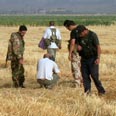
The ceasefire ended Israel's military pressure on Hizbullah and the international force mandated by the United Nations has barely started deploying in southern Lebanon.
Lebanese political forces seeking to disarm Hizbullah have not been able to prepare themselves for a new round of talks with the Shiite group and the Lebanese army is too weak to impose an arms embargo on Hizbulah.
Hizbullah and its Iranian and Syrian patrons feel that with the international community is determined to monitor the Lebanese-Syrian border to curtail arms smuggling from Syria and have intensified their efforts to rearm the group in the short time left before international observers deploy along the border.
The efforts focus on replenishing Hizbullah's secret arms storage depots with antitank and antiaircraft missiles, and long-range missiles.
Members of the Iranian Revolutionary Guards have been dispatched to Syria and Lebanon to rehabilitate Hizbullah.
A rehabilitated Hizbullah can undermine the Lebanese army and the beefed up UN peacekeeping force and prepare the group for a second round of fighting with Israel.
Hizbullah, like Israel, believes fighting is likely to reignite soon. In southern Lebanon, the group cannot act freely because of Israel's military presence, the deployment of the Lebanese army and UN peacekeepers and pressure from local residents who want to return to normal life.
Beirut remains under and aerial and maritime blockade imposed by the Israeli army and groups opposed to Hizbullah are closely watching the activities of the group.
Therefore the operation to rearm Hizbullah has been almost totally focused on the Bekaa region, which is fully controlled by the Shiite group.
The region's proximity to Syria makes it easier to smuggle arms to towns and villages in the Beeka which houses the group's logistic headquarters.
Israel has a rich experience in attempts by Arab enemies to rearm in ceasefire periods brokered by the international community.
During the war of attrition that followed the 1967 Middle East war Egypt positioned Soviet antiaircraft batteries in the Suez Canal area in violation of a UN resolution.
Israel acted with restraint but its air force fleet suffered many losses in the two years leading to the 1973 Israeli-Arab war.
Israel is monitoring activities along the Syria-Lebanon border from the air and land using advanced military technology.
Saturday's commando operation will not be the last. From reports by Lebanese TV channels it is clear that the operation targeted a base that served Hizbullah operatives responsible for smuggling arms and people from Syria.
An aerial attack on the base is possible, but a ground operation allows the collection of valuable intelligence material and the assassination of top operatives.
It is obvious from news footage shown on Arab TV networks the valley which lies 15 kilometers west of Baalbek was heavily guarded and that a fierce fight took place.
The political message Israel sends to the international community by carrying out commando operations deep in Lebanese territory is that if the United Nations fails to implement key article stated in Resolution 1701, like implementing an arms embargo on Hizbullah, Israel will do so itself. This also applies to the return of the two soldiers kidnapped on July 12.















